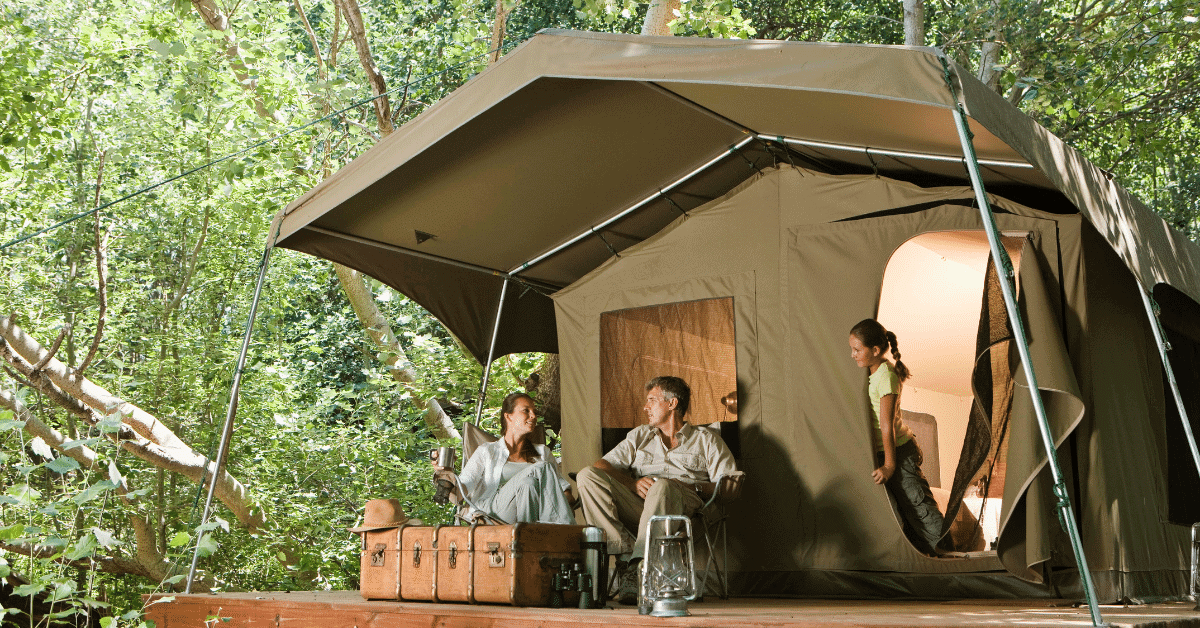What is the best tent material to buy?
The answer is simple…It all comes down to the kind of camping trips you’ll be going on.
Planning a backpacking trip? Weight will be at the top of your list of priorities.
Car camping? You might be more concerned about breathability and UV resistance.
Going camping in rough terrain? You’ll want to make sure your tent is made of a highly durable material.
Common camping tent materials you’re likely to come across in your search include:
- Nylon
- Polyester
- Canvas
- Polycotton
- Cuben Fiber
In this article, I’m going to tell you what you need to know about the characteristics of each of these tent fabrics.
Once you know the pros and cons of each fabric, you should have a better idea of which one is best for you, based on your priorities.
Ready?
Let’s go!
Basic Information About Commonly Used Tent Fabrics
With all the different materials out there, it’s easy to get confused.
When you look up specific materials, you’ll often get a bunch of technical info that might as well be written in Swahili.
Let me simplify it for you.
Here are all the important things you should keep in mind about various materials when buying a tent, minus the technical jargon.

Nylon
The most common material you’ll encounter when looking at tents is nylon.
It’s a synthetic material, with a denier rating that indicates how thick it is. The thickness of the fabric will affect both the durability and UV resistance of your tent.
Nylon is generally the material of choice for backpackers, due to the fact that it’s so lightweight.
It’s also highly breathable. This is important because airflow prevents condensation from collecting inside your tent.
One thing that isn’t great about nylon fabric is that it’s highly absorbent. That means that it doesn’t offer great water resistance. If you anticipate rainy weather, it’s a good idea to apply waterproofing spray to your tent before you head off on your camping trip.
Ripstop Nylon
Ripstop nylon is a type of nylon that has ripstop threads woven into it, for added durability.
The advantage to getting a tent made of a ripstop material is that any small holes and tears won’t turn into big gaping holes over time. Thanks to the ripstop, the damage won’t get any worse, meaning your tent will ultimately last longer.
On the downside, ripstop nylon isn’t as lightweight as regular nylon.
Pros & Cons Of Nylon
Pros:
- Lighter than polyester and much lighter than canvas
- Stretchier than polyester
- Good breathability
- Dries quicker than canvas, making it less prone to mildew
Cons:
- Absorbs water
- Less durable than polyester
- Not as UV resistant as polyester
Polyester

Polyester is another synthetic material that is often used to make tents.
Like nylon, polyester fabrics also have a denier rating, depending on how thick they are.
Sometimes, a nylon tent will come with a polyester rain fly. This is because polyester doesn’t absorb as much water as nylon does, making it a better choice for wet weather.
Polyester fabric is also more durable than nylon.
Why use nylon at all, then?
Well, even though nylon is less durable, it still has a far better strength-to-weight ratio than polyester. It’s also stretchier, which means it won’t rip as easily when under stress.
Plus, the fact that it’s lighter than polyester makes it a much better choice for backpackers.
That being said, it’s worth noting that in recent years the strength-to-weight ratio of polyester has improved a lot.
Durability was once reserved for thicker polyester fabrics. Now, there are more and more lightweight polyester fabrics available that are impressively tough. For this reason, polyester tents are definitely on the rise.
Ripstop Polyester
Like nylon, polyester can also have ripstop fabric woven into it, for a stronger material.
This will also slow wear and tear, as any insignificant damage won’t get worse over time.
It does, however, also add to the overall weight of the tent.
Pros & Cons Of Polyester
Pros:
- Better UV and water resistance than nylon
- More durable than nylon
- Also dries quicker than canvas, making it less prone to mildew
Cons:
- Heavier than nylon
- Not as breathable as nylon
- Not as stretchy as nylon, making it more prone to tearing
Canvas
Canvas is made of cotton, which is a natural material, unlike nylon and polyester.
One of the advantages of a canvas tent is that cotton is more breathable than synthetic materials.
It also performs better when it comes to UV resistance.
That all makes it great at regulating the temperature inside your tent. A canvas tent will keep you cool in the summer and warm in the winter, so you’ll always get a good night’s sleep.
On the other hand, it’s also heavier and far slower to dry. Unfortunately, this can lead to problems with mildew forming inside the tent.
The water resistance of a cotton canvas tent can be improved dramatically by weathering it. The process of weathering (or seasoning) your tent involves drenching it completely and letting it dry out. This can be done once, or several times, depending on the tent in question.
Note that if you get a canvas tent that has a PVC coating, you won’t need to weather it before you use it.
Finally, canvas tents are more expensive than most nylon and polyester tents.
Pros & Cons Of Canvas
Pros:
- Great breathability
- Better UV resistance than polyester or nylon
- Solid water resistance when weathered or coated
Cons:
- Heavier than polyester and nylon
- Slower to dry than polyester and nylon, making it more susceptible to mildew
- More expensive than polyester or nylon, in most cases
Polycotton

If you’re leaning towards canvas, consider polycotton canvas. Polycotton is a material that’s a blend of both polyester and cotton.
By combining the two, you end up with a fabric that has all the qualities of cotton, with better durability and mildew resistance.
Unfortunately, along with all the qualities, a polycotton tent also has all the disadvantages of cotton. It’s heavier than polyester or nylon, and is also more expensive.
Pros & Cons Of Polycotton
Pros:
- Very breathable
- More durable than canvas
Cons:
- Still heavier than polyester or nylon
- Tends to be more expensive than polyester or nylon
Cuben Fiber
Cuben Fiber, also known as Dyneema Composite Fabric or DCF, is the newest addition to the tent materials family.
It’s incredibly lightweight with an unbelievable strength-to-weight ratio. And, get this: it’s waterproof. That’s right – it doesn’t absorb any water.
That makes it the ideal material for a backpacking tent.
What’s the catch? Well, it’s a pretty big one unfortunately. Cuben Fiber is far less resistant to wear and tear than any of the other materials we’ve talked about.
Tents made of this material can’t be expected to last nearly as long as tents made of nylon, polyester, canvas or polycotton.
That, and the fact that they aren’t by any means cheap, make Cuben Fiber tents the least economical option you can go for.
Pros & Cons Of Cuben Fiber
Pros:
- Doesn’t absorb water, making it waterproof
- Better strength-to-weight ratio than any other material
- Excellent UV resistance
Cons:
- Inferior durability
- Seams prone to damage
- More expensive than other materials
Nylon Vs. Polyester
Nylon and polyester are both synthetic materials. Still, there are several key differences between them.
For starters, nylon has a better strength-to-weight ratio. However, polyester has a much better strength-to-weight ratio today than it did in the past.
Nylon is also more breathable, and it’s stretchier. While some might argue that it’s stretchiness is a con, as it causes wrinkles in the fabric, this is just a minor aesthetic detail. The stretchiness of the fabric means it’s less likely to tear when it’s pulled out tightly.
A couple of things polyester has over nylon is that it absorbs less water and it’s slightly tougher.
Last but not least, it provides better UV resistance. Keep in mind, however, that in the long run this will have a lot more to do with the color and denier of the fabric than the type of fabric itself.
Canvas Vs. Nylon / Polyester
If your aim is to pack light, you’d be better off going for a tent made of a synthetic material such as nylon or polyester. Natural materials such as canvas tend to be significantly heavier.
If you’re car camping, this won’t be an issue. But, if you’re backpacking, you definitely want to avoid canvas.
Synthetic materials are also generally more resistant to tearing and mildew growth. However, canvas performs better when it comes to resisting UV ray damage and fading.
Canvas is also more breathable, meaning you’re less likely to have a problem with condensation inside your tent.
Despite being more breathable, it’s actually still a better insulator than nylon or polyester. This means it’ll keep you warmer when it’s cold and cooler when it’s hot.
A canvas tent will usually be pricier than a tent that’s made of nylon or polyester.
There are, however, also tents on the higher end of the price scale that are made of synthetic materials. These are 4 season and 5 season tents that are made to withstand extreme weather conditions.
The Final Verdict
Which fabric is the best? Well, as you can see, there isn’t one right answer. It all depends on what your top priorities are.
If you’re a backpacker looking for a lightweight tent that won’t weigh you down, nylon is definitely the way to go.
Extreme adventurers camping in rough terrain would probably be better off going for polyester.
Car campers can go for anything really, including canvas, which is an excellent choice if you don’t mind the extra weight.
Hopefully you’ve now got a clearer picture of what kind of tent is going to work for you.
Now, all that’s left to do is find a model you like. Check out our tent reviews (like this one on 4-person tents) to see some of the best tents on the market today.

